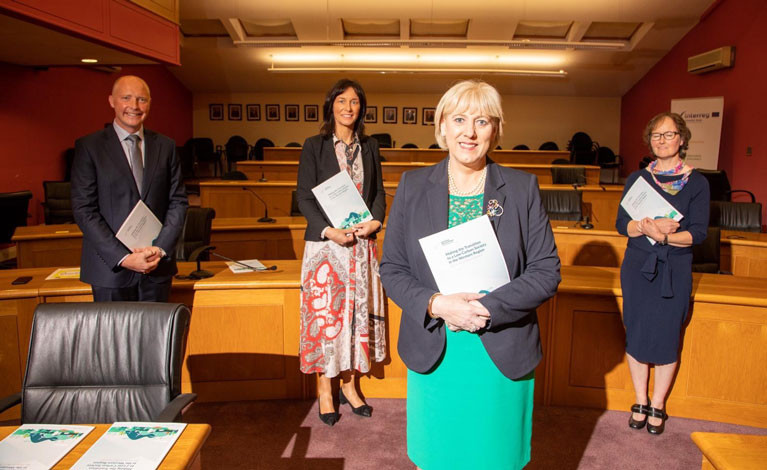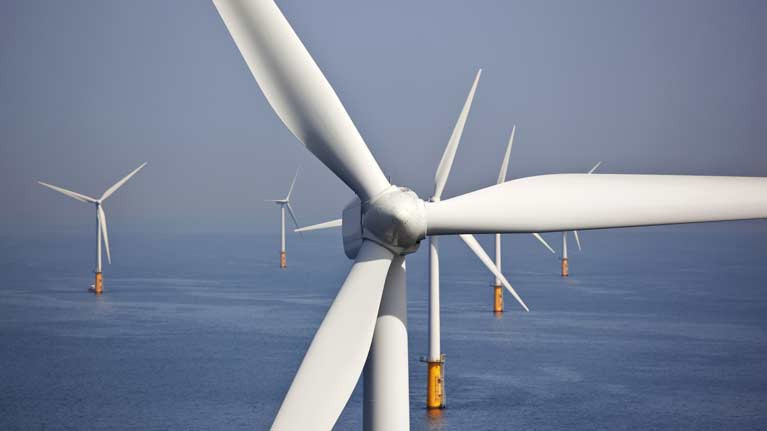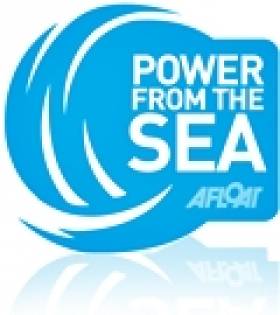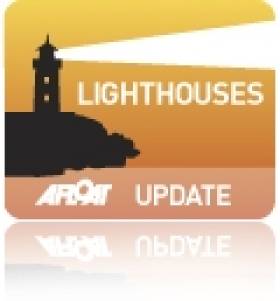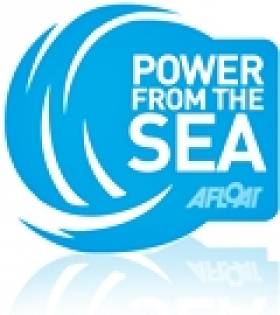Displaying items by tag: Offshore Renewable Energy
Seafarer’s Conference Will Discuss Ireland’s Offshore Renewable Energy Opportunity
The National Maritime College of Ireland (NMCI) will host a hybrid conference/webinar on Friday 4 March 2022 entitled ‘Our Offshore Renewable Energy Opportunity – Is Ireland Ready?’. The conference, sponsored by Simply Blue Group, will bring together representatives from across Ireland’s maritime and supply chain workforce to explore their preparedness to the Offshore renewables’ opportunity.
The conference will seek specifically to put the spotlight on the qualifications and certifications for the fishing industry to ensure it is fit for the dual purpose of keeping fishermen fishing, while simultaneously ensuring that our coastal communities mariners and infrastructure are best placed to contribute to and benefit from this developing maritime industry.
Minister for Agriculture and the Marine, Charlie McConalogue, will open the event, which will be Chaired by Feargal Keane from RTE Radio 1 programme ‘Seascapes’. Speakers include Noel Cunniffe, CEO of Wind Energy Ireland, Dr Alan Power, Assistant Principal, Labour Market and Skills Unit, Department of Enterprise, Trade and Employment, as well as Dr Val Cummins, Simply Blue Group, Damien Turner (IS&WFPO), Wind Europe, and a representative from BIM will participate.
Among the topics for discussion are the Policy Regime for Renewable Energy; the Expert Group on Future Workforce Skills Report on the Low Carbon Economy; A Developer Case Study – Floating Offshore Wind off Ireland’s Coasts; Co-existence of Offshore Renewable Energy with the Fishing Industry; and the future opportunities for Ireland’s fishing Industry.
Minister for Public Expenditure and Reform, Michael McGrath TD said: “The Government is committed to Ireland achieving its ambitious 2030 targets of generating 5GW of offshore wind and 80% renewables as a critical element of our national strategy to address climate change. The enactment of the Maritime Area Planning Bill will be central to this strategy. Of equal importance will be ensuring we have the requisite skills in the maritime and supply chain workforce to realise the full potential of this exciting opportunity for our coastal communities. This conference, bringing together a wide range of stakeholders will be an excellent showcase for the potential of this rapidly evolving sector.”
Speaking about the event, Captain Brian Fitzgerald, Director of External Affairs and Stakeholder Liaison, Simply Blue Group said “As Ireland struggles to meet the challenges of climate change, and fishing communities struggle with an unknown future, offshore renewable energy developments will have a far greater chance of delivering a sustainable future for all, including the incentivization of our youth to get involved, if the solutions are co-created. Ireland needs its best team on the field."
Cormac Gebruers, Head of College, NMCI, said “We look forward to hosting this significant discussion for the maritime community. We hope the event will awaken Ireland’s mariners to an exciting and co-existing future that sees a thriving and growing fishing industry working in harmony with Ireland meeting its climate action targets.”
Mark O'Reilly, MD Fishery Liaisons said “The stakeholders most affected by Ireland’s development of its ocean wealth are those in our fishing industry and associated coastal communities. It is well known that they face increasing challenges and fears for the future. In the areas suitable for offshore wind development, nobody knows the sea and the seabed better than the fishers that work there. The sensible approach is for the industry and developers to work together to harness the possibilities from offshore wind.”
To attend this conference in-person or online please contact [email protected] Full programme available below.
Mara to be Established by 2023, Ryan says, As He Opens Consultation on Maritime Area Consent Regime for Offshore Renewables
The State’s new maritime area regulatory authority (MARA) will be established and operational from 2023, according to Minister for Environment Eamon Ryan.
He said establishing MARA is “of the highest priority for Government” when he announced consultation on key aspects of the State’s new maritime area consent (MAC) regime for offshore renewable energy.
He said MAC will be a first step in a “new and streamlined planning process”.
Developers who have been assessed for, and are subsequently awarded, a MAC can then proceed to apply for development permission (planning permission), where they will undergo environmental assessment, he said.
This follows the enactment of the Maritime Area Planning Act on December 23rd, 2021.
The Maritime Area Planning (MAP) Act provides the legal underpinning for an entirely new marine planning system, he said, which will “strike a balance, between harnessing Ireland’s huge offshore wind potential and protecting our rich and unique marine environment”.
He explained that the MAC regime “will assess the viability of proposed offshore renewable energy developers in a number of key areas, including in respect of their financial and technical competency, in advance of developers proceeding to environmental studies”.
“The Maritime Area Planning Act is a transformational piece of legislation,” he said, which “provides regulatory certainty and the legislative underpinning for Ireland to embrace its abundant offshore potential”.
“Under the Act, the creation of a new MAC as a ‘first step’ in the planning process will ensure a fair and robust assessment of potential offshore renewable energy developers,” he said.
“ This will ensure that only the most viable offshore projects will have the opportunity to apply for development permission from An Bord Pleanála. At that point, they will undergo all the necessary environmental assessments,”he said.
“As Minister for the Environment, I will have the responsibility of inviting MAC applications from an initial batch of offshore renewable energy projects,” he said.
This would “represent a significant milestone in realising our ambitious climate targets of 5GW [Giga Watt] of installed offshore wind capacity by 2030 and a long-term plan to take advantage of a potential of at least 30GW of floating wind thereafter”, he added.
“After the assessment and grant of the first batch of offshore renewable energy projects, responsibility will be handed over to MARA, “he said.
This consultation on MAC regime “presents the proposed model for the assessment of the first offshore renewable energy projects”, he said, and “outlines important information on how [it] will operate”.
“Feedback received will help finalise the MAC assessment regime,” he said, with the first such consents expected to be issued in the second half of this year (2022).
The consultation will remain open for a period of four weeks until February 16th, 2022 and can be accessed here
Opportunities for Coastal Communities to Become "Project Shareholders" in Renewable Energy, Report Says
Renewable sources in the west are already generating more energy than the region needs, even before offshore energy sources are developed, a new report states.
Forecasts that connected renewable generation will “more than double” before 2030 mean there must be “active engagement” with communities on project locations, the report published by the Western Development Commission (WDC) says.
Rural communities must not only be consulted on future renewable energy projects, but schemes also offer” huge opportunities” for communities as “project shareholders”, the WDC report says.
The report on making a transition to a low carbon economy, which was published by Minister for Rural and Community Development Heather Humphreys, recommends increasing remote working and use of “remote hubs” to reduce commuting as part of moves to a low carbon future.
A recent study by Eirwind calculated that Ireland has more offshore wind resource than energy demand and could be exporting bulk hydrogen.
The 30-year strategy by Eirwind, an industry-led consortium involving University College, Cork (UCC) researchers, has recommended setting up a joint forum between the fishing and offshore wind sectors.
It has said the fishing industry must be treated as a “primary stakeholder”.
The new Irish programme for government has raised a target of 3.5 gigawatt (GW) energy production from offshore wind to five GW by 2030, and specifies the Irish Sea and Celtic Sea for development.
The new government programme also signals that 30 GW of renewable energy could be derived from the Atlantic coast.
The Eirwind report describes floating offshore wind technology as a “game-changer,” and the period 2020 to 2030 as a “defining decade” for investing in green hydrogen and grid reinforcement.
The WDC report published today and written by Dr Helen McHenry makes a number of recommendations in relation to the transition to a low carbon economy in rural and coastal areas.
These recommendations include aligning the charging infrastructure for electric vehicles with rural enterprise hubs and broadband connection points.
Other key recommendations include use of “appropriate wood fuels” in the transition period, and retrofitting a “demonstration home” in each county to show the benefits of a switch away from fossil fuels.
The report says an increase in remote working should continue post-Covid-19, and use of rural enterprise hubs would encourage time spent in towns and villages.
“There are significant opportunities to make rural towns and villages the focus of social and economic activity through the use of enterprise hubs which can facilitate increased remote working,” WDC chief executive Tomás Ó Siocháin said.
He also identified the opportunities for communities to “benefit as shareholders in renewable energy projects and more broadly to re-imagine travel and mobility across the region”.
The report’s calculation that the west already has 120 per cent of electricity needs generated from renewable sources is based on a 31.5% capacity factor for renewable energy and a demand factor of 65% of maximum demand, Dr McHenry explained
There are 1,699 megawatts (MW )installed renewable capacity, while peak demand in the region is 680MW, she said.
Plans for upscaling offshore renewable energy under the new Programme for Government will fail unless the State agencies receive more resources, an industry group has warned.
The Marine Renewables Industry Association (MRIA) has described as “revolutionary” the new targets, which include increasing offshore wind energy from 3.5 gigawatts (GW) to five GW off the east and south coast by 2030.
The programme aims to draw up plans for exploiting the west coast renewable energy resource, and promises a major scientific research programme with a focus on wave energy and floating wind energy.
The programme also commits to approving new consenting legislation. The outgoing government had drawn up the Marine Planning and Development Management Bill, which replaces existing foreshore legislation at a time of increasing pressure on the coastal environment.
MRIA chairman Peter Coyle has welcomed the plan and ambitions, describing them as “high and necessarily complex”, but warns that agencies currently handling offshore renewables are being “run on a shoestring”.
Mr Coyle notes they are “unsustainable”, unless the relevant government department and consenting body for offshore energy are allocated “substantial” extra staff.
Currently, the Department of Communications, Climate Action and Energy and Bord Pleanála hold these roles.
“You cannot have a revolution in climate action unless there are sufficient revolutionaries,” Mr Coyle says.
Last week, outgoing Minister for Communications, Climate Action and Environment Richard Bruton issued a closing date of July 1st for public submissions on scaling up renewable energy output through offshore wind.
A consultancy report, published by Mr Bruton, outlines four options - ranging from a “developer-led” scenario, where each project would design its own connection to a more centralised “plan-led” offshore transmission development with more State involvement.
The selected model will be aligned with Ireland’s new National Marine Planning Framework, and the development consent regime for the maritime area as set out in the Maritime Planning and Development Management legislation, Mr Bruton said.
Irish Ports to Capitalise on Offshore Renewable Energy Services
#ports – The Irish Maritime Development Office (IMDO) says Irish Ports are in a good position to captialise on the growing demand for offshore renewable energy services.
Last month Afloat reported that both Minister for Communications, Energy and Natural Resources Pat Rabbitte TD and the Chairman of one of the world's leading developers of offshore wind energy, Eddie O'Connor of Mainstream Renewables spoke of Ireland's unique position as a leader of offshore power at an International Conference on Ocean Energy in the National Convention Centre in Dublin.
Ireland's offshore renewable energy resources are amongst the highest in the world with a potential of between 63,000 and 73,000 MW of power available for harnessing. Ports will play a key role in facilitating future large-scale developments and operations of ocean energy devices (wind turbines, wave energy converters and tidal turbines).
In a report published today the entitled "The Irish Ports Offshore Renewable Energy Services" (IPORES). The IMDO provides a detailed summary of information on Irish port infrastructure, facilities and management plans in relation to meeting requirements of marine renewable energy developers. The report found that at least seven Irish ports are in a good situation to facilitate and service both current and future demands of the offshore marine renewable sector. The report identifies that large scale development projects in particular have strong potential to generate several hundred new jobs and other positive economic benefits for the regions.
The report provides a number of recommendations including the establishment of clear targets to deliver new offshore ocean renewable projects at Irish ports leading to new investment and employment opportunities.
The study involved a detailed stakeholder consultation process and analysis of 14 ports around the island of Ireland including a comparison with some key renewable energy services ports in the UK and Germany. Irish Ports were categorised according to criteria that would meet the requirements to service the offshore renewable energy sector which included port infrastructure, available quay space and hinterland, depth of water, past experience with the sector, proximity to markets, potential for job creation and availability of skills and maritime services.
The full The Irish Ports Offshore Renewable Energy Services report is available for download below as a pdf
Arklow Newbuild’s Link to Former Irish Lights Tender
#FORMER IRISH LIGHTS TENDER -With the Guardian 8 preparing to set sail from her builders homeport of Arklow this month, as previously reported on Afloat.ie, her owners Gardline Marine Services also operate a former Commissioners of Irish Lights tender, writes Jehan Ashmore.
The Great Yarmouth based company operate a multi-purpose fleet which includes the survey vessel Ocean Seeker (PHOTO). She was a familiar sight as the ILV Granuaile (1970/1,943grt) while serving for three decades from the Irish Lights marine depot in Dun Laoghaire Harbour.
Built by Fergusan Brothers of Port Glasgow, she was the last traditional tender for CIL in that her working deck was positioned forward. Apart from the short career of the Gray Seal, the 2000 built successor ILV Granuaile (the third to carry the name of the Mayo pirate queen) was the first custom built tender for CIL to introduce a radical design with an aft end work deck.
Energy Minister Eamon Ryan today published the Offshore Renewable Energy Development Plan for public consultation.
Ireland's ocean territory is 10 times our land mass size. This Plan, in conjunction with the Strategic Environmental Assessment of Irish Waters also published today, looks at offshore wind, wave and tidal energy resources and how that could be maximised in the years ahead.
Crucially, this work found that Ireland could produce up to 10 times our existing electricity demand without significant environmental impacts.
Announcing the plan at the Irish International Energy Conference – Pathway to 2050, Minister Ryan said, "This Government has begun an energy revolution. We have doubled the amount of renewable energy on our system and we want to go further.
Every megawatt of renewable energy that goes onto the Irish national grid reduces our €6 billion annual fossil fuel bill, reduces our carbon emissions and creates Irish jobs. Today's study shows that we have a massive potential for renewable energy off our shores. Wind, wave and tidal off the Irish coast can produce 10 times our own electricity needs without adversely affecting the environment.
My Department is working to maximise this potential. Our recovery will be based on exports. Our capacity to produce this green electricity gives us major export potential. We are working with Scotland and Northern Ireland on the ISLES project to develop interconnection with these close neighbours. Working is advancing with 9 countries across Europe on the North Seas initiative to develop a 'supergrid' to trade this renewable power. At the end of this month I will travel to London to meet Secretary Huhne to work out a trading agreement with the United Kingdom on renewable energy.
We can create more power than we require if we go off our coasts. This is Ireland's great export opportunity and we will work to realise it".
The plan goes to public consultation around the country for 2 months where developers, investors and local communities can give their views.


























